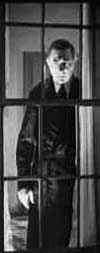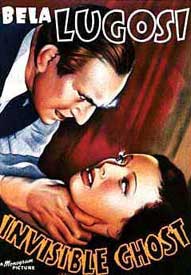The Bela Lugosi vehicle The Invisible Ghost (1941) appears to be a tale of madness rather than of the supernatural, but there are intimations of mental telepathy between Lugosi's character & his insane wife (Betty Compson). He believes she has run away with another man, but she is actually being kept hidden in the gardener's shed.
The gardener Jules (Ernie Adams) means well, but thinks the master Charles Kessler (Lugosi) won't be able to take the shock of seeing that his wife is crazy, & so takes care of her in secret, though when he goes home at night to his own wife (Ottola Nesmith), Mrs. Kessler sneaks out of the garden shed & "haunts" the gardens around the mansion, occasionally entering the mansion itself.
 The tale is rarely clear about why anything happens, or rarely makes any sense even when it is explained. Like, why on earth would the gardener, who apparently is not himself insane, keep Mrs. Kessler in the shed for a couple of years, when she clearly needs medical attention for her mental condition? Most peoples' behavior makes about that much sense in this piece. The tale is rarely clear about why anything happens, or rarely makes any sense even when it is explained. Like, why on earth would the gardener, who apparently is not himself insane, keep Mrs. Kessler in the shed for a couple of years, when she clearly needs medical attention for her mental condition? Most peoples' behavior makes about that much sense in this piece.
Once a year on the anniversary of being abandoned, Charles Kessler play-acts for himself that his wife has returned to him, & he has an elaborate meal with his imaginary companion, the servants & the entire family supporting his fantasy for its duration. His daughter Virginia (Polly Ann Young) worries about this behavior, but it's only once a year, & the rest of the year he's a rational & very sweet poppa, with touching concern even for the servants.
There have been a series of murders that occurred before the story began, all in or around the mansion, though the police don't seem to suspect anyone who lives there. As the murders continue, we discover it is the kindly lonely Charles who goes into a trance periodically, always after seeing his equally nutty wife lurking around the grounds. She either triggers his own psychosis, or induces it by her mental ability, but in either case, after each sighting he kills someone then forgets he did it.
One of the murders has a circumstantial connection to Virginia's boyfriend Ralph (John McClure), a nice fellow who the police admit couldn't possibly have committed the earlier murders, but whom they insist killed the maid/cook with whom he'd formerly been involved. The murder was done in exactly the same strangulating manner as the earlier killings, & Ralph is stated to have gotten the best attorney. Yet he is very rapidly found guilty, & even more rapidly executed.
Shortly after Ralph's execution, his twin brother Paul (John McGuire again) shows up knowing his brother couldn't possibly have done it & wanting to clear Ralph's name. This also permits the love-interest to continue with the same actor, cuz hey, if your fiance was executed unjustly for murder, wouldn't you creepily fall in love with his identical twin?
As murders continue police suspicion next falls upon Evans the butler, played by black actor Clarence Muse, who played George Washington Carver in The Peanut Man (1947), Jim in Huckleberry Finn (1931), & was the pianist Sam in the 1956/7 television series based on & named for the film Casablanca.
Much of his career was spent playing butlers or doormen because he had too regal a presence to play jungle porters & he refused to play foot-shuffling yazzuh-yazzuh types. Before he was a film actor he'd been an opera singer & minstrel man (with a couple chances to sing in his film roles too) & in the 1920s he performed with the progressive Black Lincoln Players.
Muse manages to give the cliche role of Evans the butler considerably dignity & turns in a performance better than most of the cast. In 1941, it was intensely unexpected that a black man would be cast in a role that permitted the depiction of a black man as boss over white people, as he is boss over the white servants in The Invisible Ghost & even calls one woman "You old fool!" -- very shocking for filmgoers of the day, who took for granted that blacks were fully segregated. Clarence frequently rewrote his own lines when a script was demeaning, which accounts for his ability to come off as so much more than a stereotype.
Apart from Clarence Muse, only Bela turns in a likeable performance, being both menacing while in a trance, & truly sympathetic otherwise. It lends a level of real pathos to the story since as a split personality he's both a nice man & a serial killer.
Eventually someone besides Charles sees the missing wife & they see him go into a trance upon seeing her, attempting to kill again, this time in front of witnesses. He's arrested, his crazy wife drops dead for no apparent reason, & our poor emotionally disturbed killer is hauled off to jail forever with no memory of his actions. This climax plays as though the director ran plum out of filmstock that day so just ended the story.
copyright © by Paghat the Ratgirl
|

 The tale is rarely clear about why anything happens, or rarely makes any sense even when it is explained. Like, why on earth would the gardener, who apparently is not himself insane, keep Mrs. Kessler in the shed for a couple of years, when she clearly needs medical attention for her mental condition? Most peoples' behavior makes about that much sense in this piece.
The tale is rarely clear about why anything happens, or rarely makes any sense even when it is explained. Like, why on earth would the gardener, who apparently is not himself insane, keep Mrs. Kessler in the shed for a couple of years, when she clearly needs medical attention for her mental condition? Most peoples' behavior makes about that much sense in this piece.